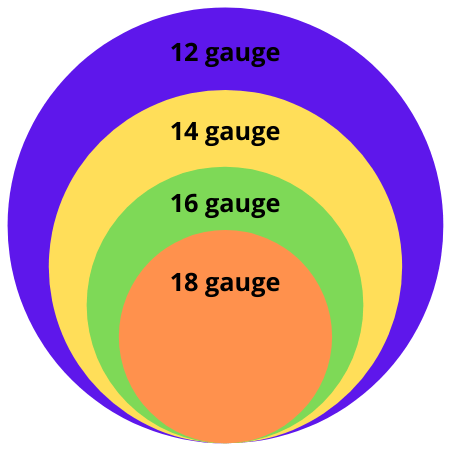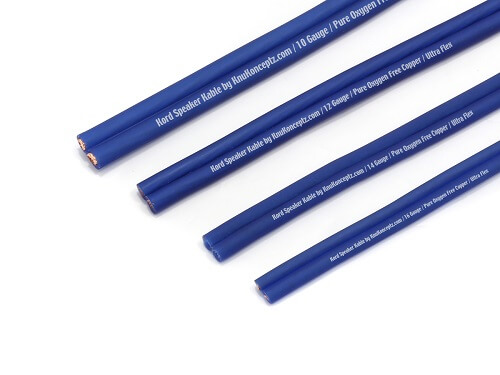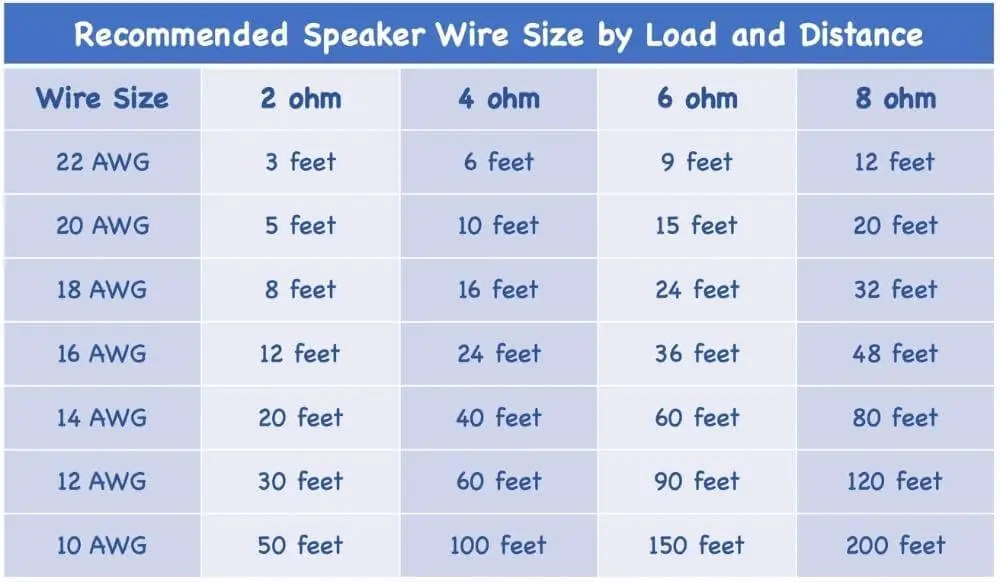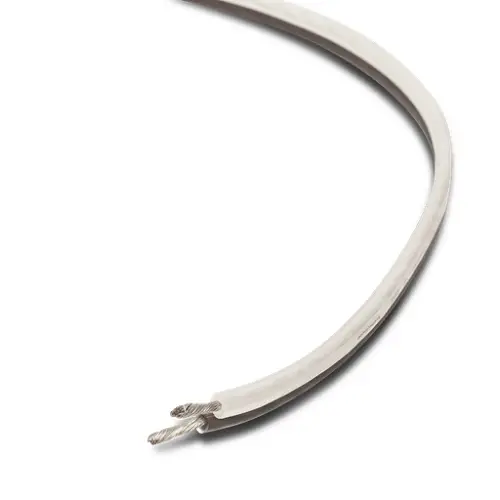Car Audio Speaker Wire Gauge Guide
Are you unsure about choosing the right gauge wire for your car audio speaker?
Relative thickness of wire gauges is the first thing to consider. Thick wire is recommended for long wire runs, high power applications, and low-impedance speakers. For relatively short runs and speakers from about 8 ohm speakers and up, a 16 gauge wire should suffice.
Like everything else when you want the perfect car stereo system, however, there are several factors to consider.
If you need to know more, this car audio speaker wire gauge guide will help you.
What does gauge mean in relation to wire (AWG)?
Wire differs in thickness and capabilities. Different sized wires have different capabilities and should be used for specific jobs.
Wire has been sorted into different categories according to its thickness. The different sizes are known as gauges.
This generally refers to the diameter of the wire. The smaller the gauge, the thicker the wire will be.
Wire with a lower gauge is usually used for subwoofers and amplifiers. Wire with a higher gauge is used more for crossovers, speakers, and tweeters.

The most common wiring system standard is the American Wire Gauge Standard (AWG). AWG has been in use since 1857 and is used worldwide to regulate the capabilities and thickness of a wire.
The British Standard Wire Gauge System (SWG) is also well-known internationally, but over the years, the AWG has become the standard of choice.
When you buy wire, it is important to make sure that it has an AWG measuring. Unfortunately, some producers don’t follow the AWG standard.
This can be a problem. If a producer doesn’t follow the AWG there is a chance that you could buy a 3 gauge wire and actually be buying a 6 gauge wire inside a 3 gauge jacket.
So make sure that the wire has an AWG measuring. This way you will definitely know what you are buying.
Check out this Wire Gauge Chart for a guide on all other devices in your stereo system.
Speaker cable types

Conductivity
There are a variety of speaker cable types that you can choose from. Oxygen Free Copper (OFC) is definitely the best option.
The copper in the OFC cables is a great conductor of electricity. You can be assured of excellent audio sound in car audio systems because OFC cables deliver maximum energy to speakers and amplifiers.
This cable works particularly well inside the engine bay, where it can be exposed to heat and damp. The small amount of tin in OFC cables helps to reduce corrosion of the cable in the long run.
Strand Count
The strand count of a wire refers to the number of individual strands that are interwoven together. These are all woven together to make a single conductor.
Two major benefits of using wire with individual strands over a solid wire are:
- Durability. Wires with individual strands are stronger and longer lasting than solid wires. Thanks to their numerous different strands, if one strand breaks you won’t experience a big loss in power transmission.On the other hand, if even a single wire in a solid wire gets busted, the power handling can decrease significantly.
- Flexibility. If you use a wire with individual strands instead of a solid wire, you will find it to be more flexible.This is very helpful because the wire can be curved and bent to your desire when installing it. Solid wires are very difficult to bend in any direction and can be difficult to install.
Speaker wire gauge chart
In most cases: 18, 16, or 14 gauge OFC will be plenty for car speakers. 12 or 14 gauge is best for long wire runs, high power applications, and low-impedance speakers.
For short runs to 8 ohm speakers, 16 gauge wire will usually do just fine, but for the same length runs with 2 or 4 ohms you’ll need down to 14 or even 10 gauge.
Check out this speaker wire chart for with your distance and load (resistance) for a more accurate estimate.

What gauge speaker wire for subwoofer
Using the wrong speaker wire is a sure way to dampen your subwoofer’s performance. It could cause humming and lead to a lengthy process of troubleshooting.
This is why it is very important to use the correct gauge wire for your subwoofer. As mentioned already, subwoofers typically use lower gauge wire.
The most common speaker wire gauges for subwoofers are 16, 14, and 12. These dual conductor wires carry positive and negative polarity and are by far the best to use for crisp, clear sound.

When choosing a gauge, it is better to round up than to round down in size. Using an 18 gauge wire when you need a 14 gauge wire will result in poor performance from your subwoofer.
Running a slightly bigger wire than what you need will not affect the performance of your subwoofer. Using an excessively large gauge wire, however, can be a waste of money.
For more information, read Car Audio Wire Gauge Guide, it covers all grounding and power cables and other audio devices.
FAQ
Does speaker wire affect sound quality?
Yes and no. For low wattage systems – No. But the resistance that the speaker will offer to the current flowing through the cable and the distance it needs to travel are two very important things to keep in mind.
The better quality wire the more power can pass through and provide cleaner sound.
Is lower gauge speaker wire better?
No, lower gauge speaker wire is not necessarily better. It is better to use thicker wires over long distances, but the distance covered for a car’s audio system is relatively short.
A 16 gauge wire should work just fine for distances up to 100 ft. Lower gauge speaker wire will not offer better audio sound.
Can you run a speaker wire next to a car’s power wire?
Yes, you can run a speaker wire next to a car’s power wire. The idea that you can’t run a speaker wire next to a car’s power wire is a myth and untrue.
Having a central ground point for all your wires is more important. By grounding them all at one specific point you prevent any noise disturbance.
How many watts can stock speaker wire handle?
Stock speaker wire can handle up to 75W. This is sufficient for general use, but if you are looking for more wattage, you will need to replace your wire with a thicker gauge.

I am a passionate and skilled car audio enthusiast with 15 years of experience in the industry. My journey started when I replaced my first set of factory car speakers, sparking a deep love for high-quality sound. Since then, I have worked as a representative for renowned brands like Kenwood and Alpine.
With a background in both retail and distribution, I have developed a comprehensive understanding of the car audio market. Currently a certified (MECP) installer in the Mobile Electronics industry, my expertise lies in delivering top-notch audio installations. My knowledge, coupled with my genuine passion, makes me the go-to professional for all car audio needs.


I’m struggling to decide whether any difference to use 12 or 16gauge speaker wire, to run from 4channel amp to front door speakers. Will be running about 75watts, 4ohm. About 15′ or so runs. I already have 16gauge going to the rear door speakers.
Thinking maybe not much difference at that power level or worth it to run 12gauge. Like if it was 20ft+ or 100w+
Hi Andrew!
16 gauge OFC would work just fine.
Hi Andrew,
I have a JL Audio HD600/4 amp pushing 150w per channel at 4 ohms to 150w rms speakers in a large SUV, should I use 14 awg wires or will 16 awg be enough?
I think 14 AWG might be needed for that set up.
I got a 1600 watt amp wiring kit. How big is my power wire ???
Wire size is usually 4ga.
Hi Andrew,
I am installing ans amplifier 125 watts rms per channel on 4 Ohm load speakers for all doors (4) on Toyota Highlander 2012. I was planning on using 16 Gage. Is this a good option or sure I go on a lower Gage wire?
thank you
Hi Ricardo,
16ga is fine.
Hey im trying to hook up a 2400 watt amp with 3 subs.
What gauge wire should i use?
I can only find amp install kits going up too just 1200 watts.
Hi Wayne,
Run 0 gauge power/ground; 10 gauge to the subs. I would definitely recommend big 3 upgrade.
I know RMS power is the wattage a speaker can handle without any distortion for long periods of time but is this power rating the same at all frequencies? Is a frequency sweep done to a speaker and then an average RMS power is calculated or is this the power the speaker can handle at any frequency it’s rated at?
The manufacturers running a test signal which is some type of pink noise.
Hi, I have 2 subs pushing around 600rms both. I just have a “spare” 8 gauge ofc wire. Can I use it for my sub to amp cable wire?
Hi Ronyy,
Yes, you can use 8 gauge as speaker wire.
I have a 1200watt mono amp and 2 10s. I’m running it to 1ohm can I use 18g for the subs?
I would use 14AWG, maybe even 12.
I have a sundown x15. Is okay to run 16g speaker wire to my terminal an my amp is 3k?
I’d go with 8-12ga.
I wired my x15 dual 4ohm.
POS-pos-positive on amp… then neg-neg-negative on amp. What is the final impedance?
2 Ohm load.
Andrew-
I am installing a 15″ kicker subwoofer supplied by a 500watt Rockford Fosgate amp. I am having trouble considering what gauge speaker wire I should run from the amp to the sub.
What is your recommendation?
Hi Nathan,
14ga will be just fine.
Hi,
I’m running a Rockford Fosgate 8002 2 channel amp.
Hooking up 2 12″ Fosgate P2 400watt DVC wired to 4 ohms bridged to the amp.
Is 16 guage speaker wire sufficient ?
Thank you
Hi Trav,
For speakers yes, if you make 1 run per subwoofer.
Hello,
I am running 4 new speakers (components in the front) of my Honda CRV 2005, with my amp in the back sending 75 Watts rms to 100 watt max speakers. I originally planned on hooking into factory wiring but now I think I’m going to run my own. I already have an 18 gauge nine wire half installed but since I’m going through the trouble of running my own wire should I go out and buy 14 gauge OFC to “do it right”? Thanks for your thoughts, I can’t decide.
Hello Bradley,
For that amount of power, 18ga would be sufficient for a 20ft or under. Personally, I don’t run anything smaller than 16ga. That way if you upgrade in the future, you won’t have to run new wiring.
I’m running 2 kickers that can each handle 750 RMS on a Skar 1500 watt amp, I want to wire the subs to 1 ohm, what size speaker wire do you recommend for the wiring of the subs to the amp?
Hi Manuel,
12 gauge speaker wire is more than adequate for running 750 RMS to a subwoofer.
I have 2 12 inch JL Audio 12TW3’s. With a JL Audio RD1000/1 RD Series 1-channel 1000w Monoblock Class D Subwoofer Amplifier, 1000 W x 1 @ 2 Ω / 600 W x 1 @ 4 Ω – 14.4V., with a kicker amplifier kit with 8awg/60amps/600 watts., is this going to be sufficient ?
Thanks!
Hi Lamar,
No, 4 AWG power/ground wire.
I am running a JL RD400/4 with 4 JL door speakers getting 75 watts rms at 4 Ohms per channel. I was planning on utilizing the stock speaker wires(18 gauge), would this be fine or should I replace existing wire with 16 gauge? I don’t know how much length I will be running, but I would assume my longest wire will be about 20ft. Thank you.
Hi Julio,
I would upgrade to at least 16AWG.
Hi, I’m trying to add a single pioneer 10″ subwoofer to my car’s deck without amplifier for a subtle kick in the bass. I don’t want to use full power from the sub. The JVC deck manual says I can replace the rear speaker with a subwoofer without using an amp. I am just not sure if the 14 gage speaker wire I have is too big to run the 5′ distance from the deck to my sub. The sub says that it’s 450 Watts max output. (120W nom). My other question is can I connect the 14 gage wire to the tiny 18 (or 20) gage in the back of my JVC deck?
I’m overwhelmed trying to figure this out myself..
It’s hard to calculate the wire size properly without knowing the impedance of your subwoofer, but I would say you might even need 12 AWS. If you have the 14 already, try them, the proof will be in the pudding. And you shouldn’t have a problem connecting them to your current system.
Hi,May I know 10 inch woofer 300watts install amplifier 1600w,what speaker size needed? 14ga or 12ga..thks
Hi,May I know 10 inch woofer 300watts install amplifier 1600w,what speaker size needed? 14ga or 12ga..thks
I am installing a Kicker 46 HS10 subwoofer in my boat. The wiring harness that comes with it is a 14 Gauge power wire with a 17 foot length, and I will need all of that length. In reading some forums I see that some folks recommend running a 10 or 12 gauge power wire. I dont want to damage the harness by trying to pry the 12 gauge out, could I solder a heaver gauge wire to the 14 gauge supplied?
I would think a 14 gauge should be good enough for that distance. you can solder two different sized wires together, but if you splice a 10 or 12 gauge cable to the 14, the bit of 10/12g will act as the dominant length 14 gauge anyway.
I have a Rockford Fosgate R2-1200×1 amp powering two P3D4-12 DVC subs. Wiring them to a 1 ohm load (1200 watts total rms/600 rms per speaker). Amp says it takes 8 awg speaker wire, and speaker 10 awg. I am assuming this is the maximum diameters? So would 12 awg be large enough on this without losing any power?
Power for speakers….already running 1/0 power and ground.
I would go with what the manufacturer recommends.
I am wondering what gauge of speaker wire to run to 2 alpine x-w10d4. 10″ wired to a 2 ohm load at 1800 watts rms?
I would say 12 gauge speaker wires should be fine…
I am going to hook up 4 JBL 300 watt speakers to a Rockford Fosgate 600×4 amp. I am thinking car audio wire is a little small so what wire from battery to amp including ground and wire to speakers?
It depends on the length, but for the ground wire you’re looking at 8AWG or even 4AWG. For the speaker wires, it depends on the impedance, but if it’s 4 ohm, you’re looking at probably 16AWG.
Hi, I am wiring 2x dual 2 ohm 750W subwoofers to a 2000W amp and I can’t seem to find on a forum or tutorial the safe wire gauge for running powers to both my amp and to the speakers. I got about 10’ of 2 gauge AWD for the power to my amp, but I don’t know the safe size for running the speakers. Please help I don’t want this to explode!
Hi Hunter, sorry for the delay in getting back to you. If you didn’t get the answer you’re looking for look here and determine the size to how your set up is. Hope this helps.
I don’t know much about subwoofer systems besides that I like the way they sound! I’m getting (2) Rockville K5 W15K5S2 15″ 2000 Watt Car Subwoofers+Sealed Sub Box Enclosure the wires & amp aren’t included. What size amp and wires should I get??
It depends what and how you’re running everything. What impedance will you be running them at? As a general rule of thumb, get an amp that provides 1.5 – 2 times RMS of your total speaker RMS.